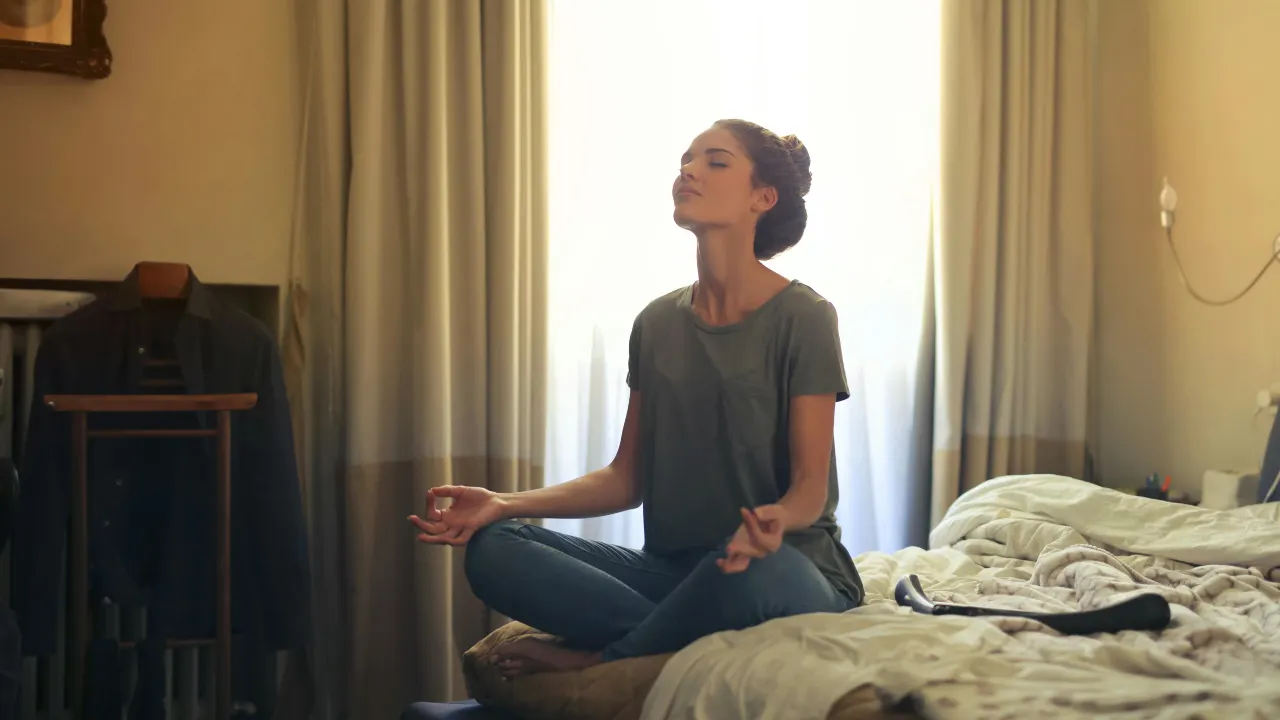In the current world with many demands, most individuals have a problem with meditation for stress and sleep. Stress from work, with partners, friends or family, uncertainty about the future and other things cause anxiety that interferes with sleep. Fortunately, meditation for stress and sleep is useful because it helps to maintain a calm state and, therefore, relieve stress. Techniques that are used in practice include breath mindfulness, which helps lower stress levels so that the body can be put into rest mode with ease. If implemented in day-to-day life, one can regain control of stress and even enhance quality sleep.
The Connection Between Stress and Sleep
Stress and poor sleep are two conditions that always seem to go hand in hand. Your cortisol levels increase every time the body is stressed, making it difficult to sleep or to remain asleep. Based on current research, meditation for stress and sleep may effectively lower such stress levels and release a signal to your body to relax.
Many of the well-known practices, including meditation, mindfulness, and deep breathing all directly stimulate the parasympathetic nerves, thus lowering cortisol levels. In essence, meditation for stress and sleep becomes a form of anxiety reduction which will help you get a better quality of sleep at night.
How Meditation for Stress and Sleep Works
Consequently, regular meditation leads to the ability to maintain a certain level of stress, which in turn gradually decreases having a clear mindset. When you meditation for stress and sleep routine, you aim to distract the mind and let go of any stress. The most famous is mindfulness meditation which is based on the idea of concentrating on your breath or anything that is happening now.
In essence, Mindfulness enables you to stop negative thinking and encourage relaxation. This act of being present can help lower the anxiety that interferes with your sleep. Stress and sleep meditation can also guide you to change the kind of thoughts that you cultivate, to eliminate the racing thoughts that prevent so many of us from enjoying a good nights sleep.
Benefits of Meditation for Stress and Sleep
- Reduces Anxiety and Stress: By the use of meditation you can free yourself from accumulated tension, thus lowering stress and anxiety. When you’re thinking of your breathing, you set off a physiological reaction that has the opposite effect to stress.
- Improves Sleep Quality: Stress and sleep meditation is effective in helping to reduce the stress of the nervous system therefore leading to better sleep. Daily meditators are able to fall asleep faster, enjoy better quality, and wake up more refreshed than non-meditators.
- Enhances Mental Clarity: A good meditation aids in clearing of the mind in a bid to enhance the desired focus. Instead of going into the daily activities with stress and dizziness, the energy is likely going to be channeled towards the tasks with direction. This leads to improved sleep too because your mind is not confused or distracted by any cognitive work.
- Supports Emotional Health: Meditation can reduce physical signs of stress and is effective as an aid to mental health. Each time you give life counseling and spiritual practices such as alchemy energy healing, you put up a defense mechanism against emotions that may have an adverse effect on your sleep.
- Fosters Long-Term Relaxation: Therefore practicing stress and sleep meditation is beneficial for long-term relaxation. As for relaxation, during a year or two the body and mind will be trained to relax after a stressful day, thus are able to go to sleep easily.
Different Types of Meditation for Stress and Sleep
There are different forms of meditation capable of treating stress and sleep problems. These include:
Loving Kindness Meditation: This type of meditation means fixing the mind on good feelings like love, patience and goodwill. Love and gratefulness help decrease such feelings as anger or frustration that may disrupt a sleeping process.
Guided Meditation: A guide, selected during the session, undertakes to take a participant through the various relaxation procedures meant to reduce stress. The situations when guided meditation seems to be really useful are when the person is a newbie and he or she cannot calm their thoughts down.
Mindfulness Meditation: I am aware of my posture, my thoughts, and my feelings, and do not criticize myself for anything I am experiencing. Another self-awareness; Stress and other negative thoughts can be prevented from disrupting your peace if you’re alert but don’t engage your feelings on them.
Breathing Exercises: Two types of breathing that are critical in meditation for stress and sleep are deep breathing. Techniques such as the “4-7-8” breath (in for 4 seconds, hold for 7 seconds, out for 8 seconds) help stimulate the parasympathetic system which puts the body to sleep.
Loving Kindness Meditation: This type of meditation means fixing the mind on good feelings like love, patience and goodwill. Love and gratefulness help decrease such feelings as anger or frustration that may disrupt a sleeping process.
Incorporating Other Healing Practices
There are other healing practices apart from meditation for stress and sleep, these are other types of meditation. For instance, in healing stone therapy, there is the employment of crystals that put the body in an appropriate energy field to achieve emotional and mental freedom or relaxation.
For those who want to get more in-depth work with a coach, working with life coach India can help to advice on reducing stress and enhancing focus. It is used in cooperation with family constellation therapy in which coaches introduce meditation techniques in order to free the individuals from the energy that has been inherited from their ancestors. Both these procedures allow for the enhancement of calming processes, and that is the primary precondition for improved sleep.
Creating a Meditation Routine for Better Sleep
Therefore, the regular practice of meditation for stress and sleep should be considered in order to receive the opportunities. Here’s a simple guide to help you get started:
- Set a Time: Select a particular time in a day that you would want to spend some time practicing the art of meditation. A number of people consider it pragmatic to practice meditation in the evening to help the body ready for sleep.
- Find a Comfortable Space: Make sure that you do this in relative quiet and you are sitting comfortably without any kind of interruption. Try to keep your body as still as you can and find a nice position where you can either sit or lie down.
- Focus on Your Breath: Take some time, and look at the screen with your eyes closed and take a deep breath. Take a deep breath and 4 seconds for inhalation, hold your breath for 7 seconds and then exhale at the rate of 8 seconds.
- Incorporate Guided Meditations: Download an application or go online to a website where you can find particular kinds of guided meditations for relaxation and sleep.
- Be Consistent: It must be practiced with some regularity, however, if one is to derive all of the possible benefits. In the long run, the stress levels as well as the amount of sleep will improve drastically to what you have always wanted.
Conclusion
This is why if you are struggling to cope with stress and have a poor nights sleep, meditation for stress and sleep is an optimal solution. Daily practices of mindfulness also lead to lower levels of anxiety, better night’s sleep and even an increase in lifespan. Further, when equally combined with the life counseling and family constellation, can form an ideal way of handling stress. While these practices focus on the healing of emotions, they also deal with the thorough patterns to enhance the permanent healthy state. When done wisely and not just for some days, you will notice the changes that consistency brings in both your mental health and the quality of sleep you get.
FAQs
How to reduce stress and sleep better?
Stress has become a major part of life now, but wearing ourselves out and not getting enough sleep is not healthy anymore.
In particular, it means that it is necessary to set up a routine for the evening to minimize stress and lay down for the night. Minimize stimulations to your brain by practicing relaxation methods such as the use of deep breather or even meditation before you sleep. Don’t consume any coffee and no heavy food in the evening, try to minimize the use of electronic devices because of blue light. It was noted that in view of stress, physical activities like walking and doing yoga can be effectively employed for improved and better sleeping pattern. Our recommendations for a cozy sleep include use of a cool, dark, and quiet environment. Both getting and regulating the amount of sleep as well as the regulation of little stressful details throughout the day may also be of aid.
What kind of meditation is good for stress?
Among all skills, mindfulness meditation has the beneficial impact in terms of stress reduction. It covers concentration on the present time, on your thoughts, emotions, and physical experience without assessment. That is why cultivating awareness is helpful – because it helps you to stop the spiral of stress and anxiety. It also easier for novices to practice in what is referred to as guided meditations in which a teacher takes the subject through the process. Also, Metta which is also referred to as loving-kindness meditation aids in the enhancement of self and other self-emotional health. Applying progressive muscle relaxation together with meditation can make the decrease of physical tension even deeper. These techniques if regularly practiced for example 10-15 minutes a day can help do away with stress and promote brain health.
Which meditation is good for sleep?
There seems to be no better technique of meditation that is more effective for sleep than the Yoga Nidra or ‘the sleeping with wakefulness’ technique. This guided meditation assists the body to completely let go and the mind stays awake which results to restful consciousness. Yoga Nidra involves three types of concentrates, that is; body scans, breath awareness and visualizations that ease an individual into sleep hence minimizing stress. Other useful kind of mind training is body scan meditation in which one mentally ‘moves’ from the toes up to the head while ‘relaxing’ muscles in each area. In big ways, both practices assist in releasing stress that is known to cause disruptions in sleep thus making it easier for one to have a good sleep.
How do you meditate for sleep and anxiety?
To meditate for sleep and anxiety, choose a comfortable position: either lying or sitting still on a chair. Knowing that stress affects the body’s nervous system, one can start the process by taking a few really deep breaths using the lungs. Look at your breathing, not at your mind, thoughts come and go, feel free to have them. You can take a body scan with the idea that each muscle group starting from the toes is now relaxed. For anxiety, use mindfulness meditation – paying attention to thoughts without becoming absorbed in them. A mundane class like thinking of a lovely scene can do this for you. There are guided sleep meditations for purchase through apps/recordings for sleep and anxiety and they can be helpful as well.







Leave a Reply